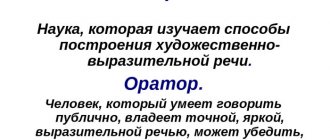It is important for every person to be able to communicate, since such a skill is a good assistant in many life situations. Almost all successes in school, work, and personal life are built on communication skills. If the information is presented by the speaker concisely and structured, then it will reach the listeners in the best possible way. The science that studies all the details of oratory is called rhetoric. It is thanks to her that you can make your speech clear and convincing. Rhetoric – what is it? Science or academic discipline?
What is teaching?
What does the word "rhetoric" mean? Translated from Greek, the word rhetoric looks like “rhetorike” and means “oratory.” Initially, this definition implied the ability to speak beautifully and express one’s thoughts in front of other people.
Over time, the concept of rhetoric changed several times, which was influenced by changing periods of people’s cultural development. Therefore, this science, from antiquity to the present time, was perceived differently.
It was founded by the sophists, who said that rhetoric is a discipline that can teach a speaker to prove his position, manipulate and dominate discussions. In modern times, the basis of such a science is harmonizing speech, the search for truth, and stimulation of thought.
Now the word rhetoric is understood as a discipline that allows you to study methods of forming speech, characterized by expediency, harmony, and the ability to influence. In this regard, the subject of rhetoric acts as a mental-speech action. Rhetoric combines the teachings of philosophy, sociology, and psychology, which helps to achieve effective verbal interaction with any public.
Thus, modern rhetoric is considered from three sides:
- This is a science that examines the art of speech, which has specific standards for public speaking in front of people, allowing one to achieve a good result when influencing listeners.
- This is the highest level of skill in delivering a speech in front of an audience, mastery of words at a professional level and excellent oratory.
- An academic discipline that helps students instill the rules of public speaking.
Thus, general rhetoric studies the rules for constructing expedient and persuasive speech, which helps make the speech vivid and memorable.
VERBAL AND NON-VERBAL SPEECH
Oratory is the art of speaking. All this is studied in rhetoric.
Verbal speech is text that can be written on paper.
You are now reading verbal speech.
Nonverbal speech is sounds, gestures, pauses, intonations...
What is not in these lines.
Verbal speech does not change when the speaker changes.
Words remain words.
Nonverbal speech varies among speakers.
Nonverbal speech changes depending on the speaker.
Both forms of speech are important to the public.
Nonverbal is even more important, research shows.
Verbal speech is taught at school. And, in my opinion, they teach very well. Therefore, there is almost no request for such a speech.
Two or three people out of a hundred is not a request.
The demand for nonverbal speech is very great.
This is what we teach first.
But this is all rhetoric . She studies both verbal and non-verbal SPEECH .
It also includes poetics, prose theory, argumentation, etc...
How did this story end?
The entire group completed training in the Basic course and moved on to the second. Everyone was satisfied with the skills they received. Including the woman who said that I was teaching the wrong rhetoric.
What does science study?
The subject of rhetoric, as a science, includes methods of forming useful oral and written speech, as well as the process by which thoughts are transformed into speech.
In order to determine the tasks of rhetoric, it is necessary to know about its main directions. There are two of them:
- Logical, in which the main aspects are the ability to convince the listener and effectively present information.
- Literary, in which the most important elements are the richness and attractiveness of words.
Taking into account the fact that in this science these directions are combined, real rhetoric sets itself the task of making speech correct, convincing and expedient. Having defined what rhetoric is and why it is needed, there is no doubt about its necessity in the life of a person, especially those engaged in public activities.
What is rhetoric
Oratory, or rhetoric, is the art of words. This concept includes at least six skills:
1. The ability to formulate answers on the go, without getting lost if the question was unexpected.
2. The skill of colorfully conveying anything to listeners or interlocutors.
3. Using facial expressions and gestures, reinforce the intonation of the voice.
4. The ability to add emotionality to a story that does not evoke any feelings in the narrator.
5. The ability to remember all the necessary facts so that your opponent cannot be confused by an unexpected attack.
6. The ability to remain calm in disputes and the ability to lose them.
A talented rhetorician can ask for a speech for at least an hour without ever losing the thread of the story and the attention of the listeners. Pauses, filler words, awkward hesitations and sight reading
are absent in the ordinary speech of such people. It doesn’t matter whether he has this talent naturally or whether the speaker has studied for a long time. For those who do not have time to attend face-to-face courses, there is an option to choose online public speaking courses. More details here.
Rhetoric allows ordinary situations to be presented as incredible, and makes boring stories exciting. And this works not only with oral speech, but also with written speech. For someone who has mastered public speaking, business and personal correspondence will no longer cause difficulties.
Rhetoric in ancient times
The origin of rhetoric began in ancient Greece. Due to the fact that democracy was being formed in this state, the ability to persuade gained considerable popularity in society.
Every resident of the city had the opportunity to undergo training in oratory, which was taught by the sophists. These sages considered rhetoric to be the science of persuasion, which studies ways of verbally defeating an opponent. Because of this, the word “sophism” subsequently caused a negative reaction. After all, under them, rhetoric was considered as a trick, an invention, but earlier this science was considered the highest skill, skill.
In Ancient Greece, many works were created that revealed rhetoric. Who is the author of the classic Greek treatise on this science? This is the well-known thinker Aristotle. This work, called “Rhetoric,” distinguished oratory from all other sciences. It defined the principles on which speech should be based and indicated the methods used as evidence. Thanks to this treatise, Aristotle became the founder of rhetoric as a science.
In Ancient Rome, Marcus Tullius Cicero, who was involved in politics, philosophy and oratory, contributed to the development of rhetoric. He created a work called "Brutus or on the Famous Orators", describing the development of science in the names of popular speakers. He also wrote a work “On the Speaker,” in which he talked about what kind of speech behavior a worthy speaker should have. Then he created the book “Orator”, revealing the basics of eloquence.
Cicero considered rhetoric the most complex science, unlike others. He argued that in order to become a worthy speaker, a person must have deep knowledge in all areas of life. Otherwise, he simply will not be able to maintain a dialogue with another person.
Rhetoric
Teaching rhetoric consists of three parts:
- Basic course in rhetoric.
- Second course in rhetoric.
- Master course in rhetoric.
The main objective of the Basic Rhetoric Course:
Learn to speak beautifully in front of an audience, both with a prepared speech and impromptu.
Objective of the Second Rhetoric Course:
Rhetoric. We are practicing the performance.
Not only speak well and make good gestures, but also be able to conduct a dialogue with the audience. In the second year of rhetoric, attention is paid to questions, answers, and avoidance of answers. Plus the technology of writing your own speech and presentation. / More details about the Second Course in Rhetoric /
Development of rhetoric in Russia
Rhetoric in Russia arose on the basis of Roman science. Unfortunately, it was not always in such demand. Over time, when political and social regimes changed, the need for it was perceived differently.
Development of Russian rhetoric in stages:
- Ancient Rus' (XII–XVII centuries). During this period, the term “rhetoric” and educational books on it did not yet exist. But some of its rules were already applied. People at that time called the ethics of speech eloquence, piety or rhetoric. Teaching the art of the word was carried out on the basis of liturgical texts created by preachers. For example, one of these collections is “The Bee,” written in the 13th century.
- First half of the 17th century. During this period, a characteristic event was that the first Russian textbook was published, revealing the basics of rhetoric.
- The end of the 17th – the beginning and middle of the 18th century. At this stage, the book “Rhetoric”, written by Mikhail Usachev, was published. Many works were also created, such as “Old Believer Rhetoric”, works “Poetics”, “Ethics”, several lectures on the rhetorical art of Feofan Prokopovich.
- XVIII century. At this time, the formation of rhetoric as a Russian science took place, to which Mikhail Vasilyevich Lomonosov made a huge contribution. He wrote several works dedicated to it, of which the book “Rhetoric” became the basis for the development of this science.
- Beginning and mid-19th century. This period is characterized by the fact that there was a rhetorical boom in the country. Famous authors published a large number of textbooks. These include the works of I.S. Rizhsky, N.F. Koshansky, A.F. Merzlyakova, A.I. Galich, K.P. Zelensky, M.M. Speransky.
However, starting from the second half of the century, this science begins to actively supplant literature. Soviet people studied stylistics, linguistics, speech culture, and criticized rhetoric.
Laws of word art
Rhetoric at any time had its ultimate goal - to influence listeners. A special role in achieving this is played by expressive speech, as well as visual and expressive means.
Scientists divide this science into two types - general and particular. The subject of general rhetoric includes general methods of behavior when pronouncing speech and the practical possibilities of their application in order to make speech effective.
This variety includes the following sections:
- rhetorical canon;
- speaking in front of an audience;
- rules on how to argue;
- conversation norms;
- teachings about everyday communication;
- communication between different nations.
By studying these sections, the speaker gains knowledge about the main features of speech use, which are the basis for every master of words.
General rhetoric studies ways to achieve mutual understanding between the speaker and the audience. For this purpose the following laws were developed:
- The law of harmonizing dialogue. The speaker must awaken the feelings and thoughts of the listeners, turning the monologue into a dialogue. It is possible to build harmonious communication only through dialogue between all people participating in the discussion. The essence of this rule is more accurately revealed by the following laws.
- The law of listener orientation and advancement. The person at whom the orator's influence is directed should have the feeling as if he, together with the speaker, is moving towards the intended goal. To achieve this effect, the speaker must use words in speech that determine the order of events, connect sentences and summarize expressions.
- The law of emotional speech. A person speaking in front of an audience must himself experience the feelings that he is trying to evoke in the audience, and also be able to convey them through speech.
- Law of pleasure. It implies the ability to present speech in such a way that it brings pleasure to listeners. This effect is easy to achieve if the speech is expressive and rich.
A particular type of rhetoric is based on a general type and involves the specific use of general provisions in certain areas of life. Thus, science studies what rules of speech pronunciation and behavior a speaker needs to apply depending on the situation.
There are a lot of private rhetorics, but they all fall into two main groups:
- Homiletics.
- Oratory.
The first group implies the speaker’s ability to repeatedly influence the audience. This includes church and academic types of eloquence. In modern rhetoric, this group includes propaganda that is carried out in the media.
Thus, with academic eloquence, a speaker, giving several lectures, should not speak anew each time about the purposes of their conduct, their necessity, and so on. It is enough for him to talk about this in the first lecture, and in all the rest the general task will be expanded through the study of a new topic.
Oratory is not capable of influencing people many times over. In this regard, the speaker must be able to correctly conclude each speech. This group includes judicial, everyday, socio-political and other types of eloquence.
Currently, oratory has grown quite widely, so a specific type of rhetoric has already begun to be divided into its own subspecies. For example, administrative, diplomatic, parliamentary and other rhetoric were distinguished from socio-political eloquence.
RHETORIC AND ORATORICAL ART. WHAT IS THE DIFFERENCE?
During the first lesson, one woman said that I was teaching rhetoric incorrectly .
Both I and the other training participants stared at her in surprise.
She said that Rhetoric is something completely different. And these classes are similar to acting classes.
However, she liked it here and planned to stay.
It turns out that they had a rhetoric course . In which they analyzed the speeches of great speakers and composed their own speeches. They wrote a lot and spoke from ready-made speeches. Nobody forced pauses and juggled sounds. And here, as she understood, we will play with words, pauses and gestures, talk about nothing, without preparation. This is not rhetoric .
- I am an adult, I will have serious presentations in front of respectable people. Why do I need pauses and gestures? They will listen to me anyway.
Rhetoric. Verbal and non-verbal speech. What's more important?
I didn't argue.
Did not have time. The group began to argue with her. I even had to defend her











